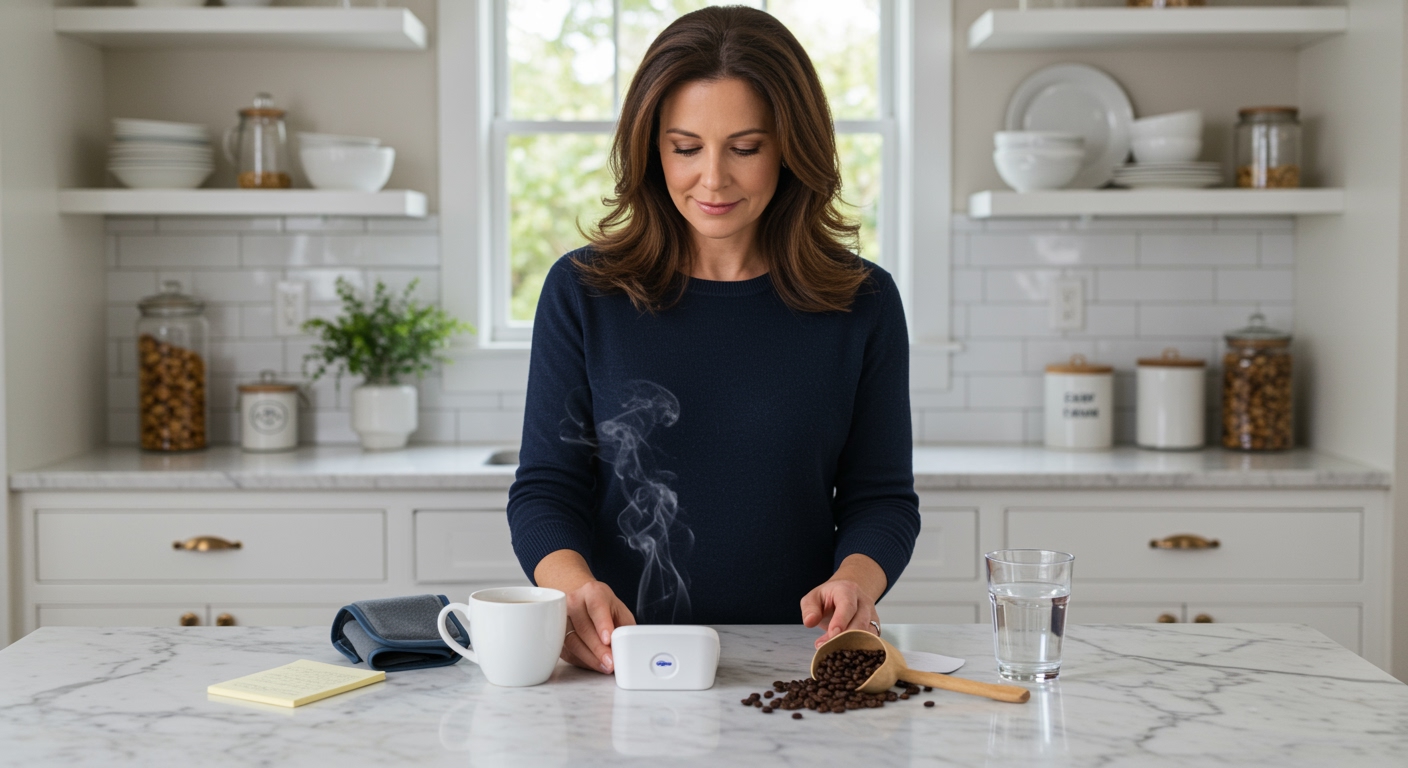✪ Key Takeaway: Coffee can temporarily raise low blood pressure, but regular consumption may reduce this effect over time.
Introduction
Your morning coffee ritual might hold the key to managing your low blood pressure symptoms.
Many people with low blood pressure wonder if their daily cup of coffee helps or hurts their condition, especially when they feel dizzy or weak in the mornings.
Hi, I’m Abdur, your nutrition coach, and today I’m going to explain exactly how coffee affects low blood pressure and whether it’s safe for your daily routine.
How Does Coffee Affect Blood Pressure?
Coffee contains caffeine, a natural stimulant that directly impacts your cardiovascular system within minutes of consumption.
When you drink coffee, caffeine blocks adenosine receptors in your brain, which normally help you feel calm and relaxed.
This blocking action triggers your sympathetic nervous system, causing your heart to beat faster and your blood vessels to constrict temporarily.
The result is a quick increase in blood pressure that typically lasts for 30 minutes to 3 hours after drinking coffee.
For people with low blood pressure, this temporary boost can actually help reduce symptoms like dizziness, fatigue, and weakness.
However, your body develops tolerance to caffeine over time, which means regular coffee drinkers experience smaller blood pressure increases compared to occasional drinkers.
✪ Fact: A single cup of coffee can raise blood pressure by 3-15 mmHg for up to 3 hours.
Is Coffee Safe for Low Blood Pressure?
Coffee is generally safe for people with low blood pressure and may even provide beneficial effects.
Unlike high blood pressure, where caffeine can be problematic, low blood pressure patients often benefit from the cardiovascular stimulation that coffee provides.
The temporary increase in blood pressure can help improve circulation to your brain and other vital organs, reducing common low blood pressure symptoms.
Many doctors actually recommend moderate caffeine consumption as part of managing orthostatic hypotension, which causes dizziness when standing up.
However, you should be mindful of your individual response, as some people may experience heart palpitations or anxiety even with low blood pressure.
The key is finding the right balance that provides benefits without causing uncomfortable side effects.
✪ Pro Tip: Start with one cup of coffee in the morning to assess your individual tolerance and response.
What Is the Best Timing for Coffee?
Timing your coffee consumption strategically can maximize benefits for low blood pressure management.
Morning is typically the best time to drink coffee because blood pressure naturally drops overnight, and many people with low blood pressure feel worst upon waking.
Having coffee 30 minutes before activities that typically trigger symptoms, like standing for long periods or exercising, can help prevent dizziness.
Avoid drinking coffee late in the day, as it can interfere with sleep quality, and poor sleep can worsen low blood pressure symptoms the next day.
If you experience afternoon fatigue due to low blood pressure, a small cup of coffee around 2 PM can provide relief without affecting nighttime sleep.
Remember that caffeine takes about 30 minutes to reach peak effectiveness in your bloodstream, so plan accordingly.
✪ Note: Stop drinking coffee at least 6 hours before bedtime to maintain healthy sleep patterns.
How Much Coffee Should You Drink?
The optimal amount of coffee for low blood pressure varies by individual, but moderation is key for most people.
Most adults can safely consume up to 400 milligrams of caffeine daily, which equals about 4 cups of regular brewed coffee.
For people with low blood pressure, starting with 1-2 cups per day is usually sufficient to notice beneficial effects.
One 8-ounce cup of brewed coffee contains approximately 95 milligrams of caffeine, though this can vary based on brewing method and bean type.
Pay attention to how your body responds and adjust accordingly – some people need more caffeine to feel benefits, while others are sensitive to smaller amounts.
If you experience jitters, rapid heartbeat, or anxiety, reduce your intake even if your blood pressure is low.
Consider spreading your coffee consumption throughout the day rather than drinking large amounts at once for more consistent effects.
✪ Pro Tip: Track your symptoms and coffee intake for one week to find your optimal daily amount.
Are There Any Risks to Consider?
While coffee is generally safe for low blood pressure, there are some potential risks to keep in mind.
Excessive caffeine consumption can lead to dependency, meaning you may experience withdrawal symptoms like headaches and fatigue when you skip your usual coffee.
Some people develop caffeine sensitivity over time, experiencing anxiety, insomnia, or digestive issues even with moderate consumption.
Coffee can interact with certain medications, including some blood pressure medications, so always consult your doctor about potential interactions.
Drinking coffee on an empty stomach may cause stomach irritation or acid reflux in sensitive individuals.
If you have other health conditions like anxiety disorders or heart rhythm problems, caffeine might worsen these conditions even if it helps your blood pressure.
Always monitor your overall health and discuss any concerns with your healthcare provider, especially if you notice unusual symptoms after drinking coffee.
✪ Note: Pregnant women should limit caffeine to 200mg daily, regardless of blood pressure status.
The Bottom Line
Coffee can be a helpful tool for managing low blood pressure symptoms when consumed thoughtfully and in moderation.
Small daily habits create big health changes over time, and your morning coffee might be one of them.
I would love to hear about your experience with coffee and low blood pressure – please share your questions or thoughts in the comments below so we can learn from each other.
References
At NutritionCrown, we use quality and credible sources to ensure our content is accurate and trustworthy. Below are the sources referenced in creating this article:
- Mayo Clinic: Blood pressure: Does it have a daily pattern?
- American Heart Association: Hypertension and coffee consumption
- Harvard Health: Coffee and your blood pressure
- PubMed: Effects of caffeine on blood pressure





